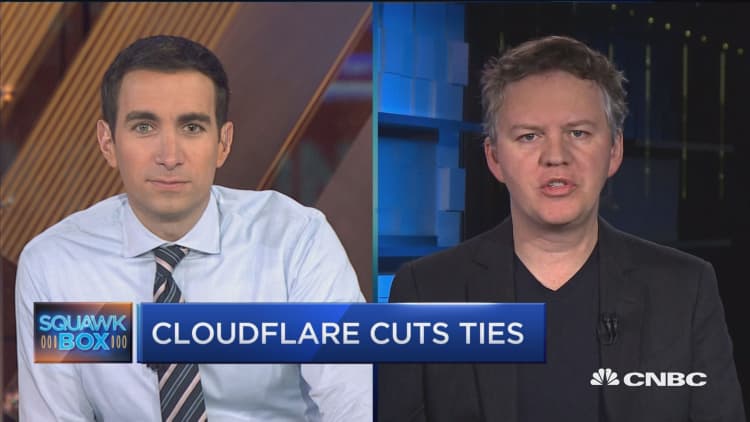Twilio co-founder and CEO Jeff Lawson has had a charmed 2018. Even after the recent stock market slump, shares of his cloud software company have tripled in value this year, bolstering Lawson's net worth by hundreds of millions of dollars.
But while it's been a good year for Twilio, whose technology powers text and video-based communications systems, Lawson is distressed by what he sees among his Silicon Valley peers.
He can't understand why it's so hard for companies to stand up to hate speech and cut off abusers.
"It's an easy decision to make," Lawson said in a phone interview this week while in Europe meeting with customers. "There's a responsibility that we all have to help ensure we're not just building a good company but a better society around us."
Lawson wrote a blog post on Monday titled, "Words matter, and they're destabilizing the American tribe." The post came after a mass shooting in Pittsburgh, where a gunman stormed the Tree of Life synagogue and killed 11 Jewish worshippers, and after another person mailed explosive devices to prominent Democrats (none exploded).
In both cases, the people accused of these crimes shared their violent hate speech on social media networks.
Lawson criticized the current "power-holders" in America for allowing white nationalism and other once-extreme views to be discussed and debated openly. But he also slammed "social media companies who go out of their way to ensure that extreme right wing views are treated fairly."
Lawson told CNBC he understands there could be murky situations requiring tough judgment calls.
But he said that far too many business executives use that struggle as an excuse to do nothing.
"That's a facade that some leaders hide behind to say we're not going to try," Lawson said. "Yes, sometimes it is hard. There is a gray area."
He noted that business leaders have to deal with complicated decisions all the time.
"All day, every day we make decisions with imperfect information, whether it's hiring people, making investments or entering new regions."
Charlottesville
For Lawson, a major turning point came in August 2017, when a white nationalist rally in Charlottesville led to a violent clash. During the event on Aug. 12, a man who had reportedly admired Hitler and spread racist views on social media plowed a car through a group of protesters, killing 32-year-old Heather Heyer.
Within days, Twilio changed its terms of service to explicitly prohibit use of its products for hate speech or in any way that the company believes "degrades, intimidates, incites violence against, or encourages prejudicial action against anyone based on age, gender, race, ethnicity, national origin, religion, sexual orientation, disability, geographic location or other protected category."
Lawson said he made the decision after talking with his co-founder about how Twilio would respond if it discovered that the Ku Klux Klan was using its technology to organize a rally or promote a speech.
"None of us would be comfortable with that," he said.
But Lawson recognizes there are challenges when it comes to creating and enforcing these types of policies, especially for products that are designed to be easily accessed by large groups of people. The line can be hard to draw.
For example, large social platforms like Twitter, Facebook and Facebook-owned WhatsApp are big Twilio customers. Fringe groups have used those services to spread conspiracies and misinformation.
While Lawson disapproves of many of the things that Facebook and Twitter allow to take place on their platforms, the primary purpose of those services is not to spread hate and and that "at the core, these aren't hate groups."
When it comes to this issue, "it's a matter of stating our intentions to the world," he said.
Lawson is not shy about identifying as a Democrat and said he tends to "lean left in my personal politics." According to the Center for Responsive Politics, he's contributed the maximum $2,700 individual donation to dozens of Democratic congressional candidates ahead of Tuesday's midterm elections, as well as to Swing Left, an organization that's trying to help Democrats win the House of Representatives.
Lawson insists that taking a stand against hate speech is not a political decision. And the same is true for issues like separation of immigrant families at the border, another subject that he's blogged about, arguing that "staying silent doesn't feel like leadership to me."
"As a tech leader and public CEO, I'm often advised to stay apolitical," he wrote. "But this isn't politics."
Lawson said there may be the occasional employee who can't get behind his messaging and decides to take a job elsewhere, or the odd customer that cancels its subscription. Very little of that is happening, he said.
"I recognize we have employees of many political leanings, and customers, even board members, of many different political leanings," he said. "I'm just a firm believer that there are these certain issues defined by objective right and wrong."







